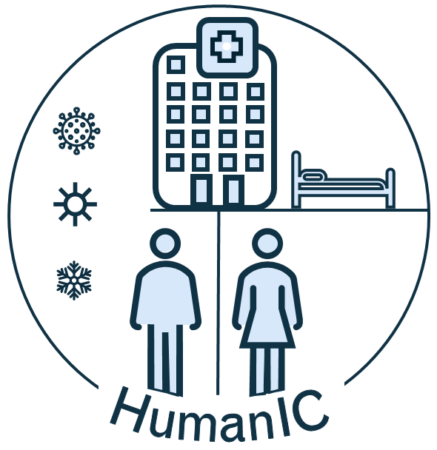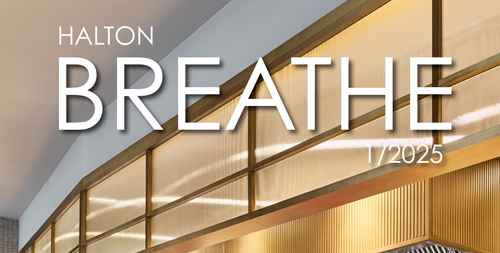Human-Centric Indoor Climate for Healthcare Facilities (HumanIC)
The HumanIC network aims to build a new approach to hospital environmental design through the concept of a human-centric indoor climate. Rather than the traditional approach of focusing solely on the building and its ventilation/heating systems, the network will develop new approaches to integrate the multi-dynamic interaction between contamination sources and airflow distribution systems with the clinical, patient and energy requirements of the hospital environment.
Through an ambitious research programme and a tailored training programme, HumanIC provides a new generation of scientists and engineers who understand the implications of these complex interfaces in future hospital design.
The HumanIC network brings together leading academic teams from across Europe with hospital and healthcare HVAC industry partners to train early stage engineers and scientists to enable a new approach to the human-centric indoor climate in Healthcare Environments.
What is a Human-Centric Indoor Climate?
The human-centric indoor climate is defined as the microenvironment which surrounds and is close to a human body. The concept focuses on human beings and surrounding environment, which should be understood as a specific microenvironment more than just the ‘physical neighbourhood’ of a human body.
The human-centric indoor climate in hospitals plays a vital role in enabling safe and effective provision of healthcare. Operating rooms, isolation rooms, treatment rooms and laboratory facilities all enable increasingly sophisticated treatment to be safely delivered to patients, while wards, consulting rooms and waiting rooms provide essential facilities for the interaction of patients and their comfort and wellbeing during recovery.
Healthcare-Associated Infections (HAIs): Over 4 million patients are estimated to acquire a healthcare-associated infection in the EU each year, and on any given day, about 80 000 patients have at least one HAI, i.e. one in every 18 patients in European hospitals. The global crisis of antimicrobial resistance means that HAI is posing an increasing cost and risk of mortality. The hospital environment is responsible for 20% of all HAI, and there is clear evidence that the design of buildings and human activities contribute to transmission of infectious diseases.
Cost and Health Implications: An improved indoor environment of a hospital building can reduce costs associated with airborne illnesses by 9%‐20%. Ventilation and indoor air is a particular concern, and numerous studies show that airflow controls the dispersion and exposure to airborne pathogens.
Pandemics and Climate Change: That was also recognised by the WHO in the case of the Covid-19 pandemic, when many hospitals work beyond capacity, with patients recover in rooms that were never designed for the purpose. This is further compounded by a changing climate that is increasing healthcare demands (future pandemics, heat-related illnesses and infections; surgical site infection, and mortality), challenging hospitals to maintain comfortable thermal conditions of human-centric indoor climate, and at the same time driving hospitals to reduce the energy consumption.
Innovative Approaches: HumanIC consortium considers the human interactions with the indoor environments and how this affects transient dispersion of contaminants, particularly in protected risky microenvironments such as surgery; it is a central prerequisite for the safe operation of these facilities to eliminate or minimise airborne pathogen threats while at the same time ensuring good thermal comfort. HumanIC generates new knowledge on the physical processes of transmission and contaminant-airflow interactions, and apply this knowledge to optimize the design of technical solutions, and develop novel methods to visualise and control human-centric indoor climate in hospital environments.
Funding and Support: The project has received funding from the European Union’s Horizon Europe research and innovation program under the Marie Sklodowska-Curie (HORIZON-MSCA-2022-DN-01, project no 101119726).

Partners:
Warsaw University of Technology, Norwegian University of Science and Technology, Technische Universität Berlin, KTH Royal Institute of Technology, Aalto University, St. Olavs Hospital, University of Coimbra – Pólo II, Universidad Carlos III de Madrid ïFundación Para la Investigación Biomédica Hospital Gregorio Marañón, University of Leeds, Granlund Oy, Halton Oy, Charité – Universitätsmedizin Berlin, ActiveTek Medica, REHVA, Drees & Sommer SE, Avidicare AB, Industria
For more information please contact:
Kim Hagström, CTO, Halton:
kim.hagstrom@halton.com
Anna Bogdan (Warsaw University of Technology) , HumanIC project coordinator
anna.bogdan@pw.edu.pl
Follow HumanIC on social media channels:
Human-IC website
Human-IC Linkedin
Human-IC Facebook
Human-IC Instagram
Human-IC X



